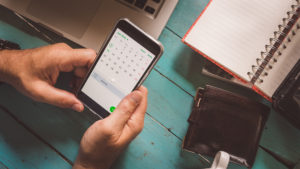THE DIGITAL DETOX TREND
The way we communicate and our use of different media have changed fundamentally in recent years. Nowadays, we have our mobile phones with us at all times and they have effectively become our ‘significant other’ (the term previously applied to our partners). Why have we become so hooked on all things digital? And what can we do to counter this addiction?
According to research, young people spend up to six hours a day on their smartphones. A few days ago, I read something even more extreme: ¾ of people aged 18-24 check their smartphones every 4.3 minutes. Those of us who are a little older are also reluctant to part with our phones. When I go to my Zumba dance class on Tuesday evenings, I never cease to be amazed at how many people take their smartphone with them. Why do this? Or think of the young couples who sit in restaurants, with each one staring at their smartphone and not talking to each other.
Hooked on our smartphones
The reality is that we have become completely addicted to our smartphones. There is even a special word for the compulsive checking of phone screens: ‘phubbing’. There are clear reasons why we like to see who just wrote to us, who viewed our LinkedIn profile or who liked our latest post:
- When a new stimulus is received, it leads to a release of adrenaline. That gives us a ‘kick’. This is positive in the short term but too much of it causes stress.
- A ‘like’ for a new post or the acquisition of followers is a virtual ‘pat on the back’. And we all crave recognition.
- But there is also the opposite motivation: when we don’t continually check what is happening in all the various networks, we have the feeling that we are missing out on something. According to one study, over half of all smartphone owners say that this fear is a major driving force behind their phone habits.
Start with simple steps
What can we do to counter this dependency? It is important to start with the simple things, such as:
- Turn off any alerts that make a sound on your smartphone and computer.
- Consider whether each e-mail is really necessary and how many people you really need to send it to – the way it used to be with hard-copy letters that you had to put in a stamped envelope.
- Don’t look at your smartphone during meetings. Apart from the fact that it is rude to do so, the brain can only focus on one thing at a time. This means that if you try to look at your smartphone and follow the meeting, you will not perform either task properly.
- During family meals or when out with friends, put your cell phone on silent or turn it off entirely and focus on communicating with those around you.
- Remove all technical devices from the bedroom except for an old-fashioned alarm clock and a reading light.
- Wait until after breakfast before reading any messages.
- Follow fewer people and websites.
- When on vacation, limit laptop and smartphone use to a maximum of 1 hour per day – if even that –, e.g. only use them for 30 minutes in the morning and 30 minutes in the evening.
After a certain amount of time, you can go to the next level:
- Don’t check e-mails after a certain time in the evening, e.g. 9.00 p.m. We sleep better when we don’t fall into bed with a digital overload.
- Have one e-mail-free day each weekend. There are apps that help us stay disciplined about this, such as Digital Detox – an app that blocks your smartphone for a specific amount of time and cannot be reversed during that period.
- In time, you can try introducing one e-mail-free week per year. There are helpful apps for this as well.
It is also very important for managers to make it clear that they don’t expect employees to respond to e-mails in the evening, at weekends or during holidays. This means that managers must act as role models and send as few e-mails as possible outside normal working hours to prevent their employees from feeling pressurized.
Digital detox
Over time, every trend is followed by a counter-trend. The concept of digital detox camps emerged in the US some time ago. These camps are designed to help digital addicts learn how it feels to be in ‘offline mode’ again and to understand that this makes it easier to relax, recharge their batteries and regain their sense of creativity. Even Apple sends its people on ‘digital diet’ courses to boost their innovative strength. This type of offering is now also available in Germany and Austria.
It is certainly good for everyone to engage in a digital detox from time to time. When it comes to ensuring a sensible approach to all things digital in daily life, I believe the important thing is to make ourselves aware of our own usage patterns and to then consciously reach decisions on how much importance we want to assign to digital communication as opposed to personal communication. This is another area where apps can prove helpful, e.g. the apps Offtime light or Rescue Time measure how much time we spend using digital media. This is because most people underestimate this. Why not test it yourself? I look forward to your feedback.
© Claudia Kraaz





